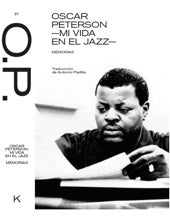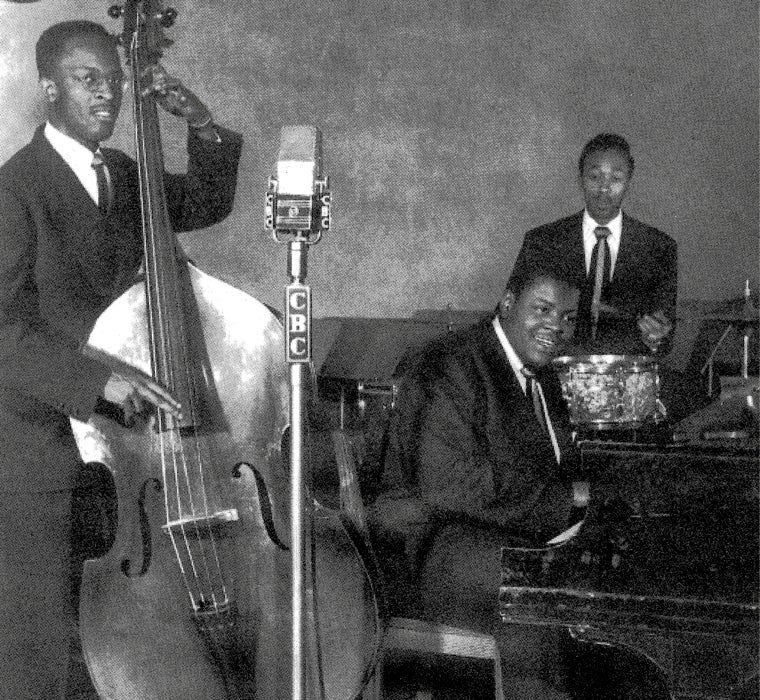Oscar Peterson, a father's obsession in the flesh and on keyboards

Not always, but fortunately almost always, the more famous and legendary a musician is, the less noticeable that trait is at close range. That must have been Oscar Peterson , a piano genius who wrote his story with such disarming humility that it seems to be telling the reader: "You can do it too."
'My Life in Jazz' ( Libros del Kultrum ), the first book about the artist's life and work translated into Spanish, will be published in Spanish on September 1st, taking advantage of the centenary of his birth, which is celebrated this Friday, August 15th.
Born and raised in Montreal (Canada), the young Peterson had a childhood similar to that of our Paco de Lucía, being destined to become a virtuoso musician due to the insistence of his father, who at the age of five forced him to take piano lessons, an instrument for which he had a "natural practical curiosity in children of that age, followed by the most absolute lack of interest," says the artist in the first confession of his autobiography.
Peterson recounts with a friendly rapport that he first had a teacher who was quickly overwhelmed by her student's abilities, yet she was unable to see his potential or find a way to develop it. Oscar told his father to fire her, and that's when Louis Hopper arrived, a maestro who knew how to hear beyond the sound emitted by the strings played by the boy. They connected, were thrilled to play together, and the student learned a lot. But Hopper soon understood that he wasn't the right person to guide Oscar's steps either, even though he didn't agree. "Louis Hopper left my life in the way indicated by the Duke Ellington song: 'All too soon'."

The book then delves into the 1940s, when Peterson was fighting it out with the Johnny Holmes Orchestra in Montreal and met Norman Granz, founder of the Verve and Pablo labels , the manager, producer, promoter, friend and faithful advisor who would launch his career to stardom. At the invitation of this avowed anti-racist (and scourge of jazz critics), he joined the legendary Jazz at the Philharmonic, later forming the trios that gave lustre to his long and triumphant career, with artists such as Ray Brown, Barney Kessel, Louis Hayes, Joe Pass, Niels-Henning Ørsted Pedersen, Jeff Hamilton, Herb Ellis and Ed Thigpen.

Over the course of a very accessible three hundred pages, Peterson lovingly and admirably portrays his fellow travelers on his distinguished jazz journey, dwelling on anecdotes and human details that fill with emotion a volume of a priori academic interest , magnificently translated by Antonio Padilla and packed with photographs illustrating the great moments that marked the life of one of the most important pianists of the 20th century, in a story that is not lacking in introspective dives and reflections on the politics of the time, racism and his own life.
Peterson would end up sharing the stage, dressing room and the discomforts of the road – as well as the harassment and harassment of his racist neighbors – with greats of the genre such as Ella Fitzgerald, Dizzy Gillespie, Billie Holiday, Count Basie, Nat King Cole, Louis Armstrong or Duke Ellington, and his career would span more than five decades, time in which he recorded more than a hundred albums, and was awarded numerous distinctions – such as those granted by the Grammys, the Black Theatre Workshop, the Peabody Conservatory of Music, or the National Academy of Recording Arts and Sciences – and his induction into the Jazz Hall of Fame.
The master pianist died in 2007 at the age of 82, just five years after publishing these memoirs (which in the Spanish edition are accompanied by access, via QR code, to the repertoire of the CD compilation that accompanied the original edition in 2002), leaving neophytes, initiates, aficionados, converts, collectors, idolaters, worshippers of the maestro and jazz lovers an incomparable legacy as timeless as the music to whose service and celebration he dedicated himself body and soul.
ABC.es





